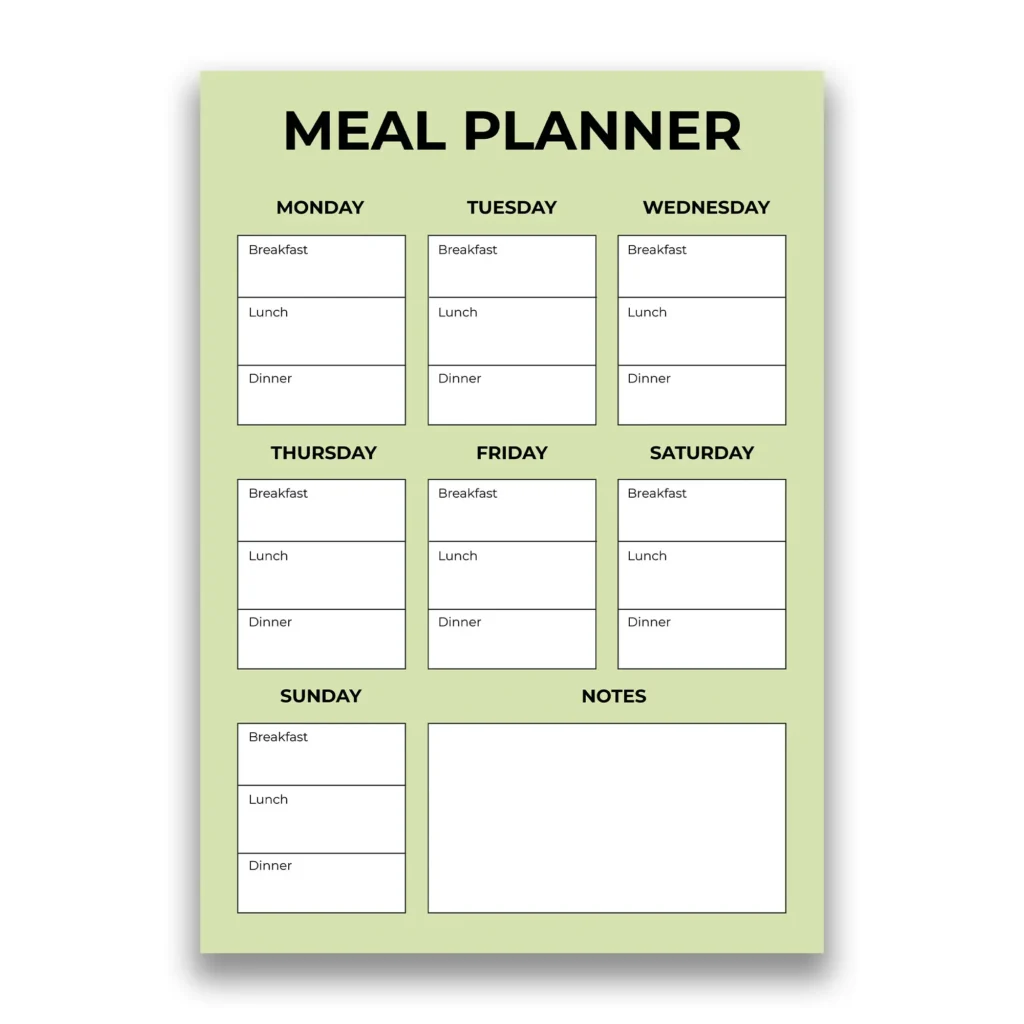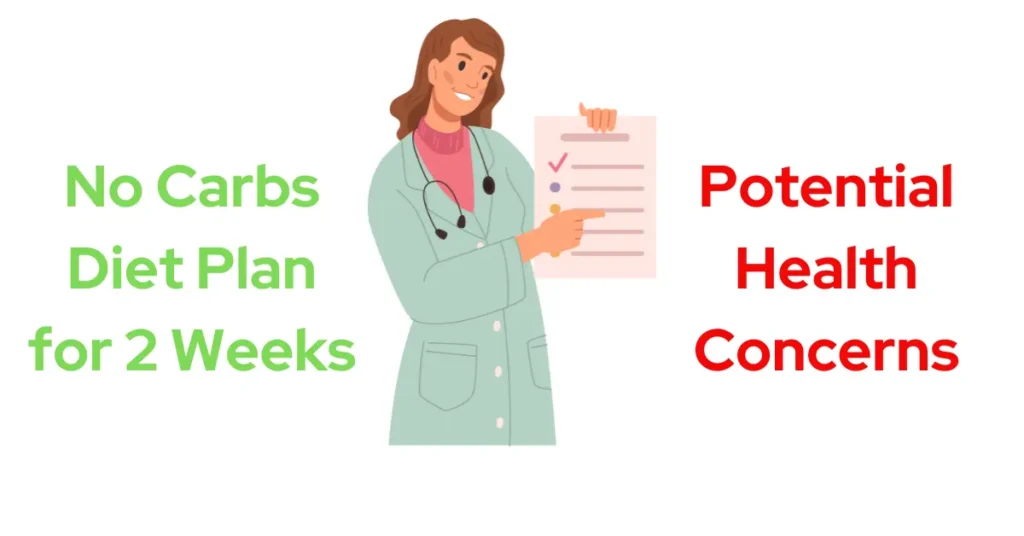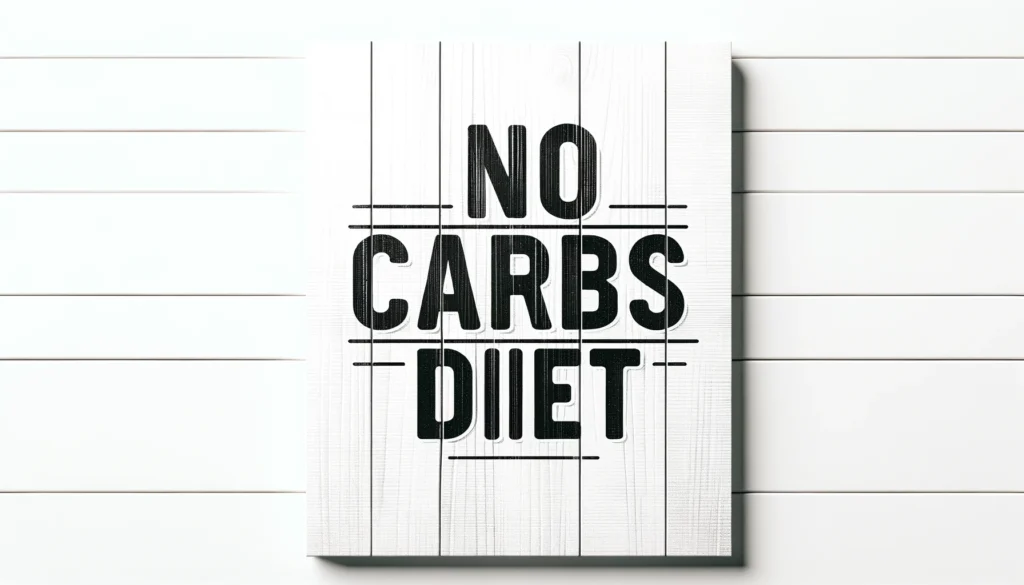In recent years, the trend toward low-carbohydrate diets has gained significant traction. Among these, the no carbs diet plan for 2 weeks is particularly popular for those looking to reduce weight quickly. It involves eliminating carbohydrates from one’s diet for fourteen days. This approach can potentially lead to rapid weight loss.
However, it is important to consider the health implications of such a diet. Completely removing carbohydrates can lead to a lack of essential nutrients. These nutrients are vital for the body’s overall functioning. Therefore, while the no carbs diet plan for 2 weeks may offer quick results, it has risks. Individuals considering this diet should carefully weigh the benefits against the potential health concerns. Making an informed decision is crucial.
The No Carbs Diet Plan
What is a No Carbs Diet?
A no-carbs diet is a dietary strategy that eliminates carbohydrates entirely. This means no bread, pasta, grains, or sugar. The focus is on consuming proteins, fats, and vegetables low in carbs. It is a method some individuals use to shed weight quickly.
By removing carbs, the body enters a state called ketosis. In ketosis, it burns fat for energy instead of glucose from carbohydrates. This is how weight loss occurs. However, it is essential to understand that this diet is unsuitable for everyone. People should consult with a healthcare provider before starting.
The Two-Week Plan
The No Carbs Diet Plan for 2 Weeks requires careful planning. Each day, meals should consist of a balance of proteins, healthy fats, and low-carb vegetables. It is crucial to keep meals varied to ensure nutritional needs are met.
A sample day might include eggs and avocado for breakfast, a salad with grilled chicken for lunch, and steak with leafy greens for dinner. Snacks can include nuts and cheese. This plan emphasizes the importance of meal variety to prevent boredom and maintain balance.
By following this no-carb meal plan, individuals can potentially see significant weight loss. However, it is vital to make sure the diet is followed safely. Including a variety of foods makes sure that even though the diet is restrictive, it does not compromise on essential nutrients.

Potential Health Concerns
Nutrient Deficiencies
When following a no-carbs diet, there is a risk of nutrient deficiencies. This diet excludes many foods that are rich in fiber, vitamins, and minerals. These nutrients are crucial for maintaining good health and preventing diseases. Without them, individuals may face issues such as poor digestion, weakened immune systems, and slower wound healing.
Those on a no-carbs diet must find alternative sources for these essential nutrients. This can be challenging but necessary. They should include a variety of low-carb vegetables and consider supplementing vitamins if needed. Consulting with a healthcare professional is advisable to ensure nutritional balance is maintained.
| Nutrient Deficiency | Low-Carb Sources | Supplement Recommendations |
| Fiber | Avocado, flaxseeds, chia seeds, leafy greens (e.g., spinach, kale) | Consider a fiber supplement if intake from food is insufficient. |
| Vitamins (e.g., A, C, D) | Bell peppers, spinach, kale, seafood (for Vitamin D), mushrooms (for Vitamin D) | A multivitamin supplement may be beneficial; specific supplements for Vitamin D or others as advised by a healthcare professional. |
| Minerals (e.g., potassium, magnesium) | Nuts (e.g., almonds, cashews), seeds (e.g., pumpkin seeds), avocados, leafy greens | Magnesium supplements or a balanced electrolyte supplement as needed. |
| Omega-3 Fatty Acids | Fatty fish (e.g., salmon, mackerel), walnuts, flaxseeds, chia seeds | An omega-3 supplement (e.g., fish oil or algae-based for vegetarians) can be considered. |
Energy Levels and Performance
Limiting carbohydrates can also affect energy levels and physical performance. Carbs are the body’s main source of energy. Without them, people might feel tired more quickly, especially during exercise.
Mental performance can suffer as well. Carbohydrates play a key role in brain function. A lack of them can lead to difficulties in concentration and memory. Individuals considering this diet should be aware of these potential effects.
They may need to adjust their activity levels or find other ways to support their energy needs. Again, consulting with a healthcare provider can help manage these concerns effectively.
| Strategy | Description | Examples/Tips |
| Increase Intake of Healthy Fats | Healthy fats can be an alternative energy source to carbohydrates. | Avocados, nuts, seeds, olive oil, and fatty fish like salmon. |
| Moderate Protein Intake | Adequate protein supports muscle recovery and energy. | Lean meats, fish, tofu, legumes, and dairy products. |
| Hydration and Electrolytes | Proper hydration and electrolyte balance are crucial for energy and performance. | Water, electrolyte-infused drinks, bone broth, or adding a pinch of salt to water. |
| Timing of Carb Intake | Consuming carbs around physical activities can help maintain energy levels. | Eat a small portion of carbs before and after workouts, such as fruits, yogurt, or whole-grain toast. |
| Mindful Activity Adjustment | Adjust activity levels or types of exercise to match energy availability. | Consider less intense but more frequent activities, such as walking, yoga, or light resistance training. |
| Mental Energy Boosts | Techniques to support mental energy and focus. | Regular breaks, mindfulness or meditation, and brain-boosting foods like berries and nuts. |
Digestive Issues
A no-carbs diet often leads to a decrease in fiber intake, causing constipation and digestive discomfort. Fiber is essential for maintaining healthy digestion. Without it, digestive issues are common.
To mitigate these effects, including non-starchy vegetables in the diet is crucial. These can provide necessary fiber while keeping carb intake low. Additionally, staying hydrated and considering fiber supplements can help.

Long-Term Sustainability
Maintaining a no-carbs diet beyond two weeks poses challenges. Nutrient deficiencies, energy level drops, and social restrictions can make long-term adherence difficult.
For those considering extending their diet, it is important to plan carefully. Including a wider variety of low-carb vegetables and possibly reintroducing some carbs strategically can help. Consulting with a nutrition expert is advisable for personalized guidance.
Risk of Ketosis
Ketosis occurs when the body starts burning fat for fuel without carbohydrates. While this can aid in weight loss, prolonged ketosis carries risks. These include ketoacidosis, a dangerous condition that can occur if ketone levels become too high.
Individuals on a no-carbs diet should monitor their health closely to avoid complications. Signs of trouble, such as excessive thirst, frequent urination, or fatigue, require immediate attention. Regular check-ins with a healthcare provider can ensure the diet does not harm one’s health.
Alternatives and Modifications
Balanced Low-Carb Approach
A low-carb diet plan for weight loss can be effective. Yet, it is essential to approach it in a balanced manner. This means including healthy carbohydrates from whole foods. Foods like vegetables, fruits, and whole grains provide necessary nutrients. They are vital for our overall health.
Incorporating these carbs ensures the body gets fiber, vitamins, and minerals. It maintains energy levels and supports digestive health. A balanced low-carb approach focuses on quality rather than just quantity. It encourages the consumption of nutrient-dense foods.
| Food Category | Examples | Benefits | Meal Ideas |
| Vegetables | Broccoli, spinach, bell peppers, cauliflower | High in fiber, vitamins A, C, and K, and minerals like iron and potassium | Steamed broccoli with grilled chicken, spinach salad with olive oil and vinegar, stuffed bell peppers |
| Fruits | Berries (strawberries, blueberries), avocado, olives | High in fiber, vitamin C, healthy fats (avocado and olives) | Berry smoothie with almond milk, avocado on whole-grain toast, olives as a snack |
| Whole Grains | Quinoa, barley, farro (in moderation) | High in fiber, B vitamins, minerals like magnesium and iron | Quinoa salad with vegetables, barley soup, farro with roasted vegetables |
| Nuts and Seeds | Almonds, chia seeds, flaxseeds, walnuts | High in omega-3 fatty acids, fiber, protein | Almonds as a snack, chia pudding, flaxseeds in smoothies, walnuts in salads |
Cyclical Carbohydrate Intake
Cyclical carbohydrate intake is another modification to consider. This involves alternating low-carb days with higher-carb days. This strategy can help manage energy levels and improve physical performance.
Cycling carbohydrates supports the body’s metabolic flexibility. It can also prevent the negative effects of a strict low-carb diet. Benefits include sustained energy, better workout performance, and improved mood. This approach allows for a more flexible and sustainable low-carb diet plan for weight loss.
Frequently Asked Question
How much weight can you lose on a no carb diet in 2 weeks?
Weight loss varies, but significant initial loss, mainly water weight, followed by gradual fat loss is common.
What happens after 2 weeks of no carbs?
Initial rapid weight loss stabilizes, body adapts to burning fat for fuel, energy levels may improve.
What is a no carb diet menu?
Typically includes meats, fish, eggs, non-starchy vegetables, nuts, seeds, healthy fats like olive oil, avocado, and coconut oil.
Can I lose weight in a week on a no carb diet?
Yes, initial weight loss is common due to water weight reduction, but long-term weight loss depends on various factors.
Conclusion
We have explored the no carbs diet plan for 2 weeks and its potential impacts. This plan focuses on eliminating carbohydrates to achieve weight loss. However, it is crucial to recognize the importance of nutrient balance and the risks of nutrient deficiencies.
Energy levels and performance may be affected, and there are concerns over digestive health and the sustainability of such a diet. The risk of ketosis is also significant, necessitating careful consideration and monitoring.
Before starting a no-carbs diet plan, it is essential to weigh the potential health concerns. Consulting with a healthcare professional or a registered dietitian is advisable. They can provide tailored advice to ensure any dietary changes are safe and effective.
For those interested in nutrition and health, ProNutriFacts offers further information. Here, you can explore more topics to make informed decisions about your dietary habits.



